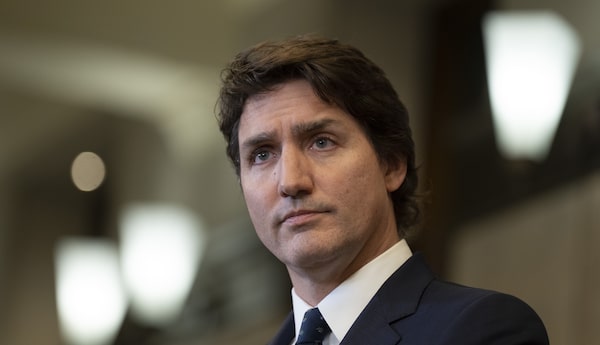
Prime Minister Justin Trudeau listens to a question during a news conference in Ottawa on Feb. 17. Nearly one year after the convoy protests, an independent commission released a report saying that the government's use of the Emergencies Act was justified.Adrian Wyld/The Canadian Press
Appropriate. The word appears 100 times in just the executive summary of Justice Paul Rouleau’s report on the federal government’s use of the Emergencies Act, because the questions boiled down to that: Was it appropriate? Justice Rouleau said it was.
That conclusion was not completely obvious to the judge. Justice Rouleau, the commissioner of an inquiry that pored through mountains of evidence, said he didn’t find the factual basis for it to be overwhelming.
But in the end, there’s no doubt about what this report was, in basic political terms: a seal of approval for Prime Minister Justin Trudeau’s decision.
Mr. Trudeau’s move to use the Emergencies Act to break up the convoy blockades a year ago was politically popular, in the sense that it had the support of the majority. But the Liberals certainly had to fear that views would change if Justice Rouleau concluded that the legal threshold for taking up emergency powers was not met.
Instead, on the key questions, Justice Rouleau’s report card was a series of checkmarks.
There was an emergency, a threat to national security in Ottawa, and potentially in other places, he found. There was reason to believe handling it was beyond the capacity of local police and provincial authorities, even if all policing tools had not been exhausted. The Emergencies Act was the only effective legal tool Ottawa had, Justice Rouleau concluded. And the emergency measures were, on the whole, appropriate, persuading some protesters to leave and helping police end it with reduced risk of injury or death.
Wesley Wark: What the Emergencies Act inquiry report got right – and wrong
There’s no way for this – or any other report on the convoy or the Emergencies Act or vaccine mandates or any number of related issues – to settle the whole business for everyone. Sometimes it seems political sentiments are baked in so firmly that nothing could change them. And legally, this is a non-binding inquiry report.
But if it had concluded the opposite – if Justice Rouleau had added up the less-than-overwhelming facts and concluded they didn’t meet the legal test for emergency powers – then Mr. Trudeau’s government, which has been looking a little shaky, would be wobbling on its axis today.
Instead, the Liberals were relieved. Mr. Trudeau walked into a press conference with four ministers to talk about his government’s duty to keep people safe – a way to declare victory in a sober tone.
The lack of joy from opponents told the same story. Bloc Québécois MP Christine Normandin said the Bloc would “take note” of the conclusions but focus on recommendations for the future.
Conservative Leader Pierre Poilievre started his press conference with a lengthy speech that covered inflation and Chinese interference, and in between accused Mr. Trudeau of sowing division that caused the emergency.
When asked whether he accepted the inquiry’s conclusions that the use of the Emergencies Act was appropriate, and if he regretted supporting Ottawa protests that Justice Rouleau described as “unsafe and chaotic,” Mr. Poilievre accused the CBC reporter who posed the question of being biased. But he did not answer it.
A politician whose support for the protesters served as a springboard to win the Conservative Party leadership didn’t really want to comment on the inquiry’s main conclusions.
Instead, Mr. Poilievre turned to the political comfort in the paragraphs where Justice Rouleau took Mr. Trudeau to task for inflaming protesters, including referring to them as a “fringe minority.”
And certainly, Mr. Trudeau’s wedge politicking, which began in earnest in the 2021 election campaign, months before the convoy ever started rolling, clearly did serve to stoke anger.
It was the element of blame that, more than anything, stuck to Mr. Trudeau in Justice Rouleau’s report, a piece that was not about process or legal threshold but the PM’s personal behaviour. And Mr. Trudeau’s victory-lap press conference also included a mea culpa for that “fringe minority” comment.
“I wish I had phrased it differently,” he said. Maybe it was easier to admit a mistake when he was just handed some validation.
It’s hard to imagine that will change a lot of opinions now, a year too late. Justice Rouleau’s seal of approval on the use of the Emergencies Act probably won’t swell the ranks of Liberal supporters, either. But condemnation of it would have been deeply damaging. Mr. Trudeau’s Liberals are breathing a sigh of relief.